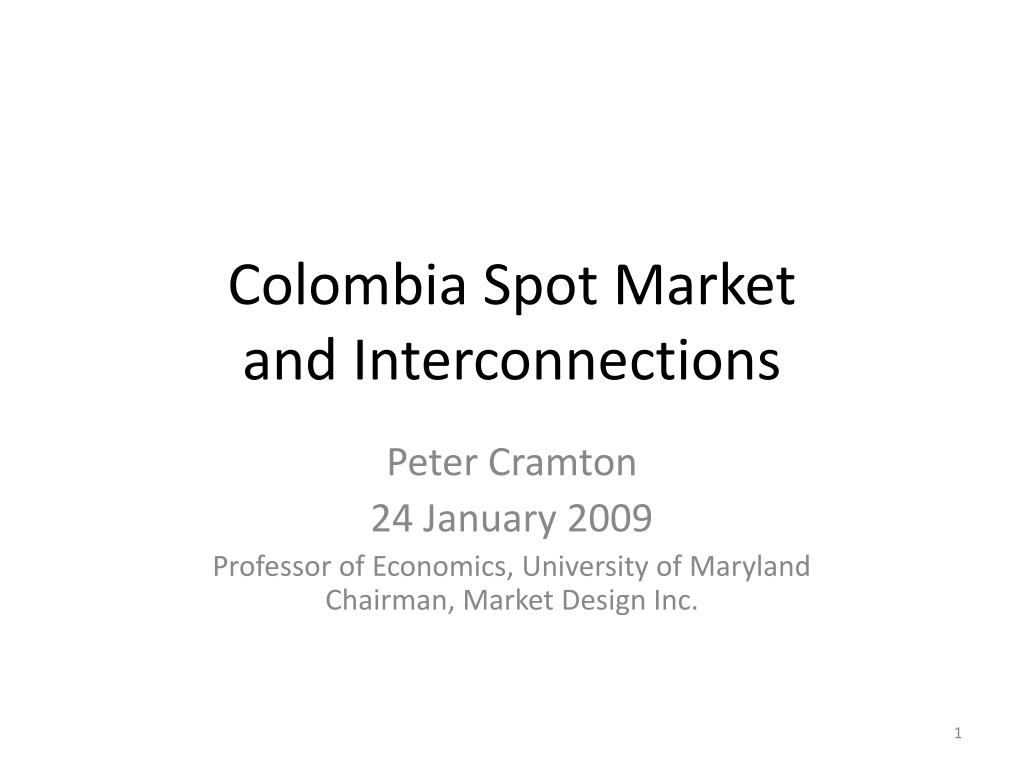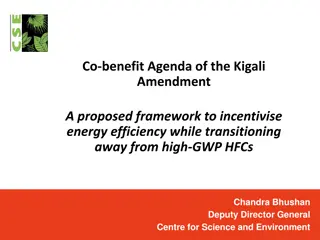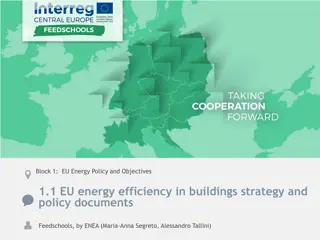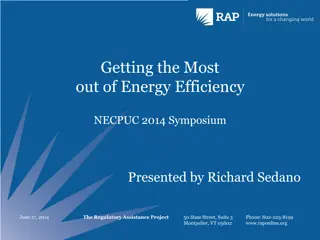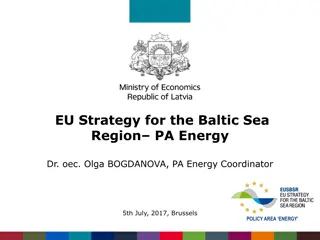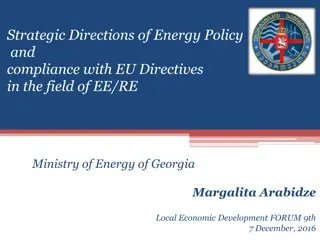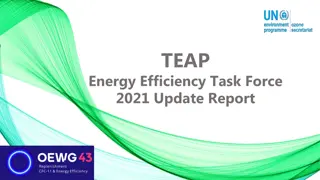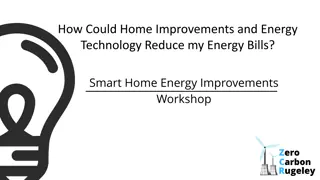Enhancing Efficiency in Energy Market Interconnections
The content discusses market interconnections between Colombia, Ecuador, Venezuela, and Panama. It highlights the impact of exports, spot market prices, congestion rents, and proposed solutions for efficient dispatch and political constraints. The focus is on optimizing energy use, managing congestion, and ensuring fair pricing mechanisms.
Download Presentation

Please find below an Image/Link to download the presentation.
The content on the website is provided AS IS for your information and personal use only. It may not be sold, licensed, or shared on other websites without obtaining consent from the author.If you encounter any issues during the download, it is possible that the publisher has removed the file from their server.
You are allowed to download the files provided on this website for personal or commercial use, subject to the condition that they are used lawfully. All files are the property of their respective owners.
The content on the website is provided AS IS for your information and personal use only. It may not be sold, licensed, or shared on other websites without obtaining consent from the author.
E N D
Presentation Transcript
Colombia Spot Market and Interconnections Peter Cramton 24 January 2009 Professor of Economics, University of Maryland Chairman, Market Design Inc. 1
Interconnections Ecuador Import 395 MW Export Venezuela Import 205 MW Export Panama Import 300 MW Export Total Import 900 MW Export 535 MW 336 MW 300 MW 1171 MW 2
Ecuador (today) Treated like Colombia demand Export to Ecuador added to Colombia demand DC Export may raise Colombia spot price PC Ecuador pays Ecuador spot price PE Difference PE PC = congestion rent Congestion rent is split between C and E Colombia gets share DC/(DC+XE) (i.e., nearly 100%) Mostly used to subsidize Colombia demand 3
Ecuador (future) Treated like Colombia demand Export to Ecuador added to Colombia demand DC Export may raise Colombia spot price PC Ecuador pays Ecuador spot price PE Difference PE PC = congestion rent Congestion rent is split between C and E Colombia gets 50% share Mostly used to subsidize Colombia demand 4
Venezuela Venezuela agent bids import price in DA market, just like Colombia supply For export, agent self-schedules (no bid) Agent pays price found from marching up Colombia supply curve by amount of self- schedule Higher Venezuela price is received by suppliers with offers between PC and PV Venezuela export does not impact PC 5
Problem with Venezuela solution Use of two prices within the same zone distorts bids Supplies compete to get the higher clearing price Pushes lower price up to higher price (the true clearing price) Result is a distorted supply schedule that is too flat at the clearing price (for lower quantities) Political trick fails Political trick introduces inefficiencies in dispatch 6
Interconnection proposal Goal Efficient dispatch in all countries Optimal use of lines Subject to political constraints Solution Use mechanism that leads to efficient dispatch Gather information sufficient for efficient dispatch Use prices that support efficient dispatch Use congestion rents to satisfy political constraints 7
Efficient dispatch Each day require supply offers from each country for a range around demand Colombia [DC 900, DC + 1161] Ecuador [DE 535, DE + 395] Venezuela [DV 336, DV + 205] Panama [DP 300, DP + 300] Simultaneously determine efficient dispatch of all units and use of all lines 8
Efficient dispatch and pricing Determine prices for each of four zones PC, PV, PE, Pp that support efficient dispatch Both suppliers and demanders in zone z are paid/pay the zonal price Pz Price differences only exist if congestion Price differences create congestion rents Congestion rents can be used to handle political constraints Fund subsidies for poor consumers 9
Consider other market improvements Three-part bids Locational marginal prices (LMP or nodal pricing) Information policy 10
Three-part bids for thermal units Start-up cost No-load cost Marginal cost 11
Motivation for three-part bids Required for efficient dispatch of thermal units Start-up and no-load costs can be significant XM cannot efficiently dispatch with this information Otherwise, generator distorts MC to account for how the bidder thinks the plant may be used Note well: Start-up and no-load costs are only paid in the event that the generator is not breaking even (as bid) over entire day 12
Market power with three-part bids Only bid start-up and no-load once a month MC only bid once a day Only a single MC bid, rather than a schedule Market power much more severe with 1-part bids Better transparency with 3-part Distortions required with 1-part Increase in MC bid (to cover start-up cost) Increase in Min operating level (to avoid no load loss) 13
Locational prices Necessary for efficient dispatch in real time Account directly for locational differences arising from transmission constraints If constraints are not binding, then no price differences 14
Locational prices and market power May be severe market power in load pockets Addressed by constraining bids when competition is limited PJM s 3-pival supplier test Can competitive supply less supply of three largest satisfy all demand in location? If not, then bids limited to cost + 10% Need estimate of opportunity cost for hydro unit 15
Improved information policy Colombia currently has full transparency All bid information revealed after bidding period Allows day-by-day punishment for deviation from tacit collusion Much easier to support tacit collusion Anonymous bids would be better Then reveal all bids after 90 days Has benefits of full transparency But does not allow immediate punishment of defectors from tacit agreement 16
